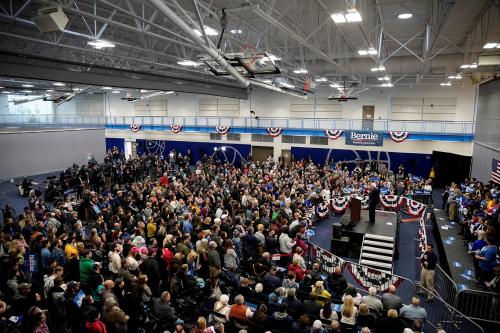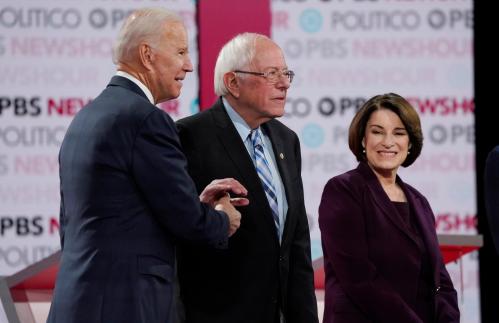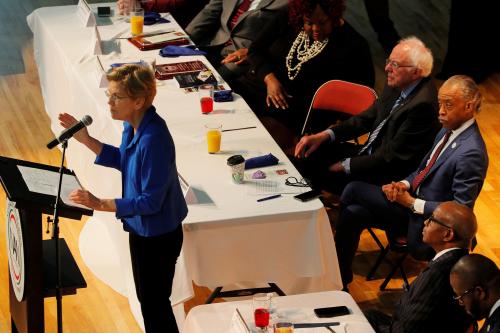The South Carolina debate was always going to be a critical one. It was the last debate before the South Carolina primary and the last debate before Super Tuesday, when the race for the Democratic nomination gets very serious.
As this season shaped up, there was a clear and simple imperative prior to the debate: Stop Sen. Bernie Sanders’ momentum or risk that it would allow him to amass a large lead on Super Tuesday, when more than a thousand delegates are at stake. Despite this clear dynamic, the other candidates simply could not focus on it.
Which is not to say that Sanders was spared attacks—he wasn’t. For instance, Sen. Elizabeth Warren, the star interlocutor of these events, attacked one of Sanders’ big weaknesses: the fact that over three decades in Congress, he simply didn’t play well with others, didn’t pass a lot of legislation and was, therefore, not a very effective leader. “I will be a better president,” said Warren. “I dug in, I fought the big banks, and I won. I dug in, I did the work and then Bernie’s team trashed me for it. Progressives have one shot and we need to take it.”
Former Vice President Joe Biden took on Sanders over his record on gun control just steps away from one of America’s worst mass shootings at the Emanuel AME Church. Biden pointed out that Sanders voted against the Brady Bill five times and that he voted to give gun manufacturers immunity from being sued. Pete Buttigieg attacked Bernie for failing to end the filibuster in the Senate saying, “How are you going to get a revolution if you won’t support a rule change?” Warren took him to task on how he was going to pay for all of his promises. And later on, when the topic turned to foreign policy, Buttigieg brought up Sanders’ ill-timed comments seeming to praise Fidel Castro, the Cuban dictator, by asking, “Why is the nominee of the Democratic Party telling us to look at the bright side of the Castro regime?”
As the front-runner, Sanders should have seen the attacks coming and figured out a way to explain himself to voters who are really worried about his candidacy. Instead, he simply reverted to his standard talking points, insisting that there was nothing revolutionary about universal health care, free education, etc. Other than avoiding the sentence “We need a revolution,” which was standard fare for him in the first eight debates, Sanders didn’t act like a candidate who was interested in expanding his base beyond his ardent supporters.
But it probably won’t matter. On the one night available to stop the Sanders momentum, the other candidates couldn’t keep their eye on the ball. In the first crucial minutes of the debate, Warren was busy attacking former New York City Mayor Michael Bloomberg’s record and his company’s record on women. Bloomberg wasn’t much more convincing on that issue than he was in the first debate, and while his overall performance was better, it may not be enough to win him delegates on Super Tuesday. His attempt at making a self-deprecating joke about his first debate performance was awkward, but not as awkward as when, discussing his contributions to the 2018 takeover of the House by the Democrats, he almost said he “bought” the Democratic majority and stopped mid-word.
Bloomberg wasn’t the only distraction from Sanders. Biden attacked Tom Steyer on his investment in a private prison that turned out to be awful to prisoners. Clearly Biden was told to do this to stop Steyer from potentially coming in ahead of him in South Carolina. But Biden should have realized he has bigger fish to fry. Biden finally got angry and it did him good. He needs a decent showing in South Carolina in order to regain his spot as the alternative to Sanders and some voters in South Carolina may take a second look at him.
The overall chaos of the evening and the tone of desperation running throughout the debate probably helped deflect from the attacks on Sanders.
The candidates did spend sometime talking about the crisis of employment and incarceration among African American men, and they made the occasional glancing reference to the fact that they were in South Carolina. But basically, appearing before the first African American electorate in the race, the candidates seemed to be ignoring the coming contest in favor of Super Tuesday.
In the end the Democratic race is no closer to having an alternative to Sanders than it was before tonight. Next up—the voters.
The Brookings Institution is committed to quality, independence, and impact.
We are supported by a diverse array of funders. In line with our values and policies, each Brookings publication represents the sole views of its author(s).








Commentary
Chaos at the South Carolina Democratic debate
February 25, 2020